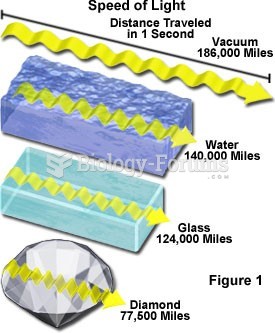|
|
|
People often find it difficult to accept the idea that bacteria can be beneficial and improve health. Lactic acid bacteria are good, and when eaten, these bacteria improve health and increase longevity. These bacteria included in foods such as yogurt.
The average adult has about 21 square feet of skin.
Normal urine is sterile. It contains fluids, salts, and waste products. It is free of bacteria, viruses, and fungi.
Looking at the sun may not only cause headache and distort your vision temporarily, but it can also cause permanent eye damage. Any exposure to sunlight adds to the cumulative effects of ultraviolet (UV) radiation on your eyes. UV exposure has been linked to eye disorders such as macular degeneration, solar retinitis, and corneal dystrophies.
No drugs are available to relieve parathyroid disease. Parathyroid disease is caused by a parathyroid tumor, and it needs to be removed by surgery.
 Frequent dining on fast food, which tends to be higher in fat and carbohydrates, may be convenient ...
Frequent dining on fast food, which tends to be higher in fat and carbohydrates, may be convenient ...
 The coolant temperature is controlled by the thermostat, which opens and allows coolant to flow to ...
The coolant temperature is controlled by the thermostat, which opens and allows coolant to flow to ...





